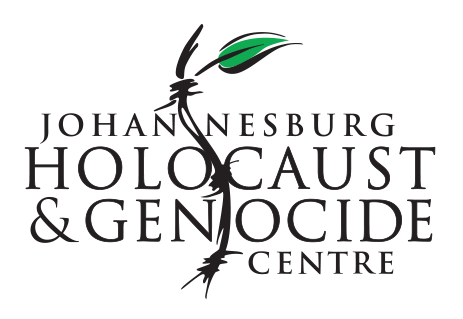Online Lesson Plans
Survivors Speak – Extracting Lessons from Stories of Survival
The four lesson plans each explore a survivors’ personal narrative and encourage students to see the 6 million victims of the Holocaust as individuals. These are stories of survival, resilience, hope, luck and courage. Each lesson plan also includes an interactive activity based on the story’s key theme to nurture engagement and dialogue in the classroom.
JHGC: Quick Studies
The Johannesburg Holocaust & Genocide Centre’s purpose and mission as a centre of memory, education, dialogue and lessons for humanity continues to be the anchor at the core of all our activities. As part of fulfilling our mission to teach, we are pleased to present to you the following short papers written by our education team as educational resources.
Topics covered include other case studies of genocide, justice, moral choices, sites of memory, combatting racism, xenophobia and more. Scroll over each tile cover below to see more.
Exploring Short Survivor Testimonies
A Note for Educators:
Survivor testimonies are first-hand accounts from individuals who had lived through the Holocaust or genocide and their stories help students to understand and empathise more deeply with the human (and inhuman) aspects of mass atrocities. They each offer a unique perspective on human behaviour and the resilience shown in the face of persecution. These stories have been selected by educators at the JHGC to support the teaching of the Holocaust and genocide and to help learners engage with these difficult histories.
These short audio testimonies were narrated by Mduduzi Ntuli and need to be placed into historical context accompanied by content about the history of the Holocaust or genocide as well as specific information about dates, places and events that are mentioned in these stories. Maps and photographs may assist with visual understanding and context to these stories.
It is important to discuss and unpack each story with your learners. Here are some suggested questions to start a discussion:
- “What changes and experiences do each of the survivors go through?”
- “What does this story reveal about human behaviour?”
- “How does this story contribute to your understanding of the Holocaust?”
- “What lessons can we learn about the rescuers appearing in these stories?”
- “Why is it important for us to learn about rescuers and acts of courage and not only about the deeds of perpetrators and bystanders?”
- “What can we learn from survivors about our moral obligation to each other?”
- “Do you think a person is born with courage or do you think it something that can be learned?”
- “Reflect on some connections you can draw between these testimonies and today’s world.”
Webinars, Podcasts and Additional Resources
The JHGC had created a variety of webinars and podcasts that could be used for educational purposes. Please see below our selection of the most useful webinars and podcasts to support your work in the classroom. You can also check out our YouTube and SoundCloud pages for a full list of videos and podcasts.
Below you will find links to the Johannesburg Holocaust & Genocide Centre’s Virtual Exhibition Highlights. We are pleased to enable you to experience our permanent exhibition virtually with these short and impactful video clips created by our dedicated team. Thank you to Think Ahead Education Solutions who partnered with the JHGC to make this virtual exhibition series possible.
For additional online resources from other institutions, please download this PDF with our recommendations.
